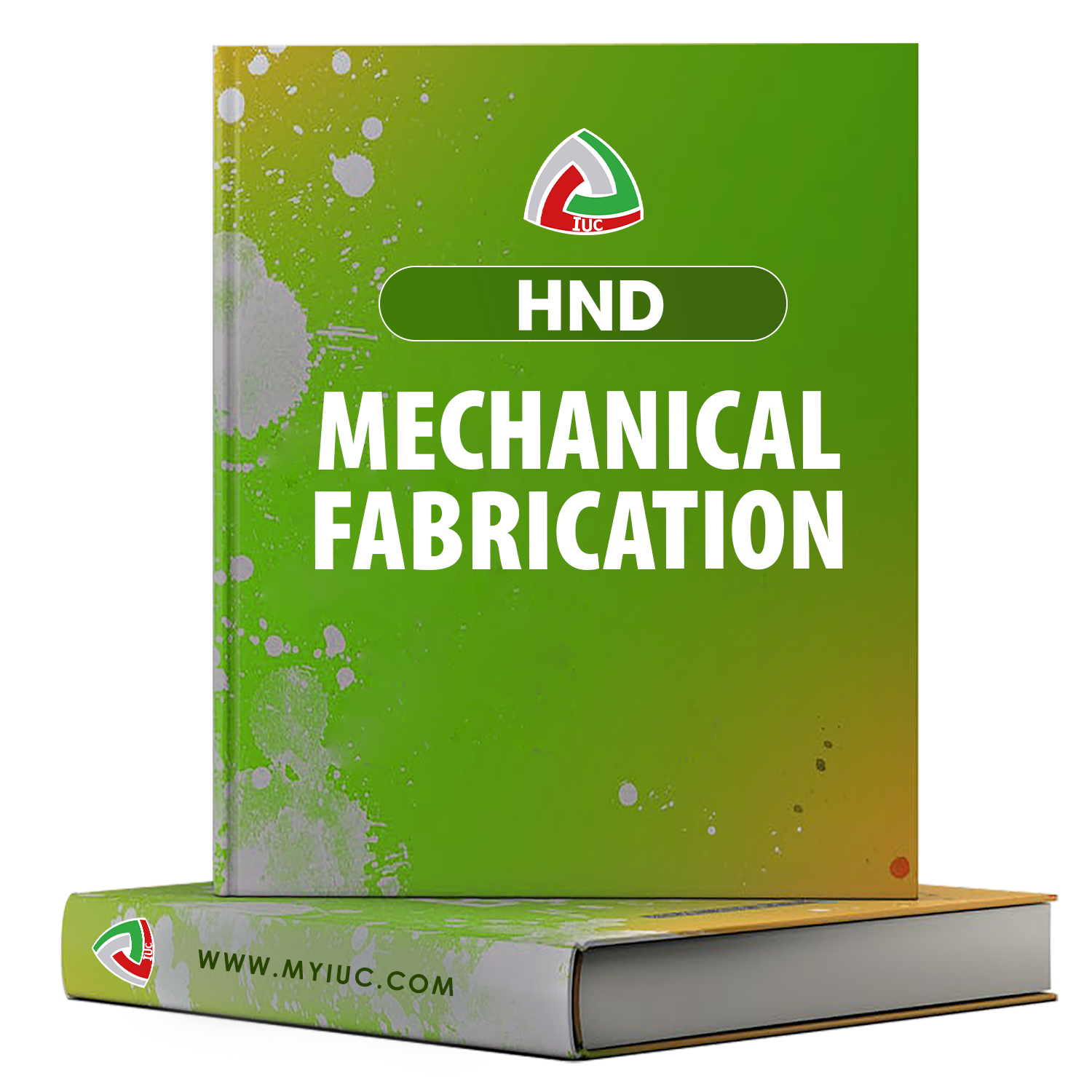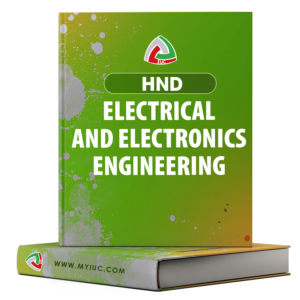Higher National Diploma (HND) in Mechanical Fabrication is designed to provide students with advanced skills in the design, production, and assembly of mechanical systems and components. This program focuses on the practical application of engineering principles to the fabrication of complex metal structures and machinery, making it an ideal choice for individuals looking to build a career in manufacturing, engineering, or construction industries. Students will gain a comprehensive understanding of mechanical fabrication processes, including welding, metal cutting, assembly techniques, and surface finishing. The curriculum covers essential topics such as engineering materials, manufacturing processes, mechanical drawing, and computer-aided design (CAD), ensuring students are equipped with both technical knowledge and practical expertise. The program also introduces students to modern fabrication technologies, including CNC machining, robotics, and automated production systems, providing them with exposure to cutting-edge industry practices.
| PROGRAMME |
SEMESTER |
DURATION |
CREDIT |
PARTNER INSTITUTION |
ACCREDITATION |
| MECHANICAL FABRICATIO |
2 SEMESTERS |
2 YEARS |
120 |
MINESUP |
MINESUP |
CORE OBJECTIVES
1. Mathematics and Applied Mechanics
- – Engineering Mathematics: Focuses on advanced mathematical techniques such as calculus, algebra, and differential equations, essential for solving mechanical problems in fabrication and design.
- – Statics and Dynamics: The study of forces in equilibrium (statics) and forces in motion (dynamics) that are foundational for understanding mechanical structures and their behavior during fabrication.
- – Strength of Materials: Understanding material properties and their behavior under stress, strain, and loads, which is critical for designing durable fabricated components.
2. Basic Engineering Principles
- – Mechanical Drawing and CAD: Introduction to technical drawing, including the use of CAD software to create detailed 2D and 3D models for mechanical parts, assemblies, and fabrication blueprints.
- – Material Science: Understanding the properties and types of materials (metals, plastics, composites) and how these materials behave under different conditions, which is crucial for selecting the right materials for fabrication.
- – Mechanical Workshop Practices: Hands-on training in using various fabrication tools and machinery such as lathes, mills, welders, and cutting equipment.
3. Core Mechanical Fabrication Disciplines
- – Welding Processes: Study of different welding techniques such as MIG, TIG, stick welding, and gas welding, which are essential for joining materials in fabrication.
- – Welding Inspection and Testing: Understanding of non-destructive testing methods (NDT) to ensure the quality of welds, including ultrasonic, visual, and x-ray testing.
- – Material Joining: Techniques for joining materials through methods like brazing, soldering, and adhesive bonding, and their applications in mechanical fabrication.
- – Machining Operations: The study of various machining techniques such as turning, milling, drilling, and grinding, which are essential for shaping and finishing components.
- – CNC Machining: Computer Numerical Control (CNC) programming and operation of CNC machines for precision fabrication of mechanical parts.
- – Sheet Metal Fabrication: Techniques used in the fabrication of thin metal sheets, including cutting, bending, and forming, to create mechanical structures.
- – Mechanical Assembly: Study of assembly techniques and processes, including the use of fasteners, bolts, rivets, and other methods to assemble fabricated components into complete machines or systems.
- – Precision Fitting: The practice of aligning and fitting mechanical components with tight tolerances to ensure the functionality and performance of the final product.
- – Fabrication of Structural Components: Methods for producing heavy-duty and load-bearing components, such as beams, frames, and supports, typically used in construction and industrial machinery.
4. Engineering Design and Drawing
- – Design Principles: Introduction to the fundamentals of mechanical design, including considerations such as material selection, load-bearing capacity, and manufacturability in fabrication processes.
- – Technical Drawings: Creating and interpreting detailed drawings and blueprints, including orthographic projections, isometric drawings, and assembly diagrams.
- – 3D Modeling and Prototyping: Use of 3D modeling software like SolidWorks or AutoCAD to design and simulate mechanical components and assemblies before fabrication.
CAREER OPPORTUNITIES
1. Mechanical Fabricator
- – Role Description: Mechanical fabricators are responsible for assembling and constructing mechanical systems and structures using materials like metals, plastics, and composites. They use various fabrication techniques such as welding, cutting, and machining to create components for industrial machinery.
- – Skills Required: Proficiency in welding, machining, reading blueprints, and using fabrication equipment.
- – Industries: Manufacturing plants, automotive, construction, aerospace.
2. Welding Engineer
- – Role Description: Welding engineers design, implement, and supervise welding processes in the fabrication of metal parts and structures. They ensure that welding methods and techniques meet quality and safety standards.
- – Skills Required: Expertise in various welding techniques (MIG, TIG, Stick), material science, welding inspections, and safety protocols.
- – Industries: Metalworking, construction, shipbuilding, aerospace.
3. Maintenance Engineer
- – Role Description: Maintenance engineers ensure that mechanical systems, machinery, and equipment are working efficiently and safely. They perform regular inspections, diagnostics, repairs, and upgrades to maintain operational efficiency.
- – Skills Required: Troubleshooting, mechanical systems knowledge, preventive maintenance techniques, and problem-solving.
- – Industries: Industrial plants, power plants, factories, transportation companies.
4. Fabrication Supervisor/Manager
- – Role Description: Fabrication supervisors oversee the day-to-day operations of a fabrication workshop or manufacturing floor. They manage teams of fabricators, ensure the quality of work, and ensure projects meet deadlines and specifications.
- – Skills Required: Leadership, project management, team coordination, and quality control.
- – Industries: Construction, manufacturing, oil and gas, automotive.
5. Heavy Equipment Mechanic
- – Role Description: Heavy equipment mechanics maintain and repair large machinery used in construction, mining, and manufacturing. They ensure that equipment such as cranes, excavators, and bulldozers operates efficiently and safely.
- – Skills Required: Mechanical systems knowledge, diagnostic skills, and problem-solving.
- – Industries: Construction, mining, transportation, and manufacturing.








